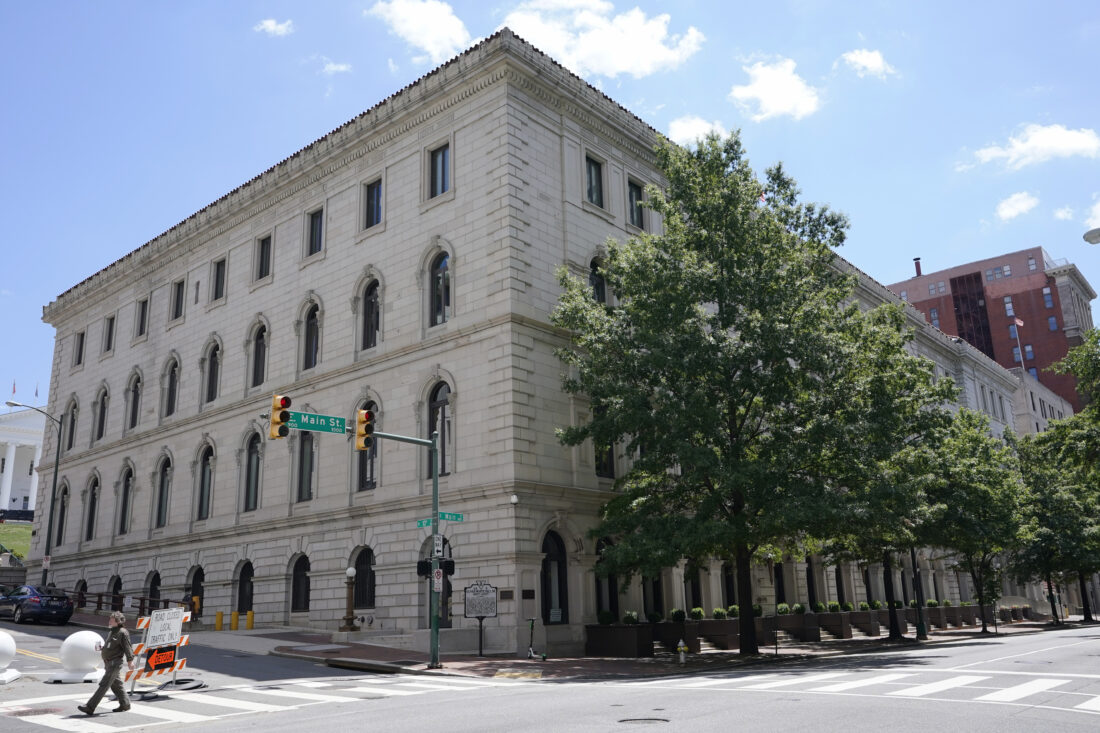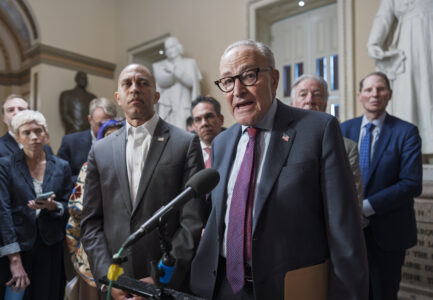West Virginia congressional delegation signs onto transgender sports court brief
West Virginia Legislature, Trump administration also file briefs

A pedestrian passes by the US 4th Circuit Court of Appeals Courthouse in Richmond, Va. West Virginia's transgender sports ban violates the rights of a teen athlete under Title IX, the federal civil rights law that prohibits sex-based discrimination in schools, an appeals court ruled April 16, 2024. (AP Photo/Steve Helber, File)
CHARLESTON — West Virginia’s entire congressional delegation signed onto a friend-of-the-court brief in support of the state’s law banning transgender girls and women from participating in sports for biological girls and women. Forty-eight Republican members of Congress — 15 U.S. Senators and 33 members of the U.S. House of Representatives — filed an amici curiae brief Friday with the U.S. Supreme Court for two cases dealing with banning transgender girls and women from participating in middle school, high school and college girl’s/women’s sports: Hecox v. Little, and West Virginia v. B.P.J. The amici curiae brief — also called a friend-of-the-court brief — included West Virginia’s two U.S. Senators and two House members: U.S. Sens. Shelley Moore Capito and Jim Justice, 1st District Congresswoman Carol Miller, and 2nd District Congressman Riley Moore. “Women’s sports should remain just that — women’s sports. West Virginia has a proud tradition of female athletes who deserve a level playing field, and I’m proud to stand with my colleagues in defending that principle — something I’ve long championed,” Capito said in a statement Friday. “West Virginia passed a law saying men shouldn’t play in women’s sports,” Moore said. “This is just common sense – men and women are biologically different. In West Virginia v. B.P.J., the Supreme Court agreed to review a decision by the U.S. Fourth Circuit Court of Appeals, which blocked enforcement of House Bill 3293, relating to single-sex participation in interscholastic athletic events. HB 3293, passed by the West Virginia Legislature in 2021, requires student-athletes in middle school, high school or college to participate in sports that match the student’s sex assigned at the time of their birth. The law applies to sports regulated by the NCAA and other college interscholastic organizations. The law is now called the Save Women’s Sports Act. Becky Pepper-Jackson, a Harrison County high school cross country and track athlete who has identified as a girl since third grade and takes puberty-blocking medication, filed a lawsuit against HB 3293 in May 2021 shortly after the law went into effect. After a lower court allowed the law to be enforced, the Fourth Circuit overruled that decision, preventing the law from being enforced while the case was pending. The supporters of the Save Women’s Sports Act and the similar Idaho law being challenged argue these laws align with federal Title IX and the Equal Protection Clause of the Fourteenth Amendment, arguing that biological sex, not gender identity, is a valid and necessary distinction in athletic competition to ensure fairness and equal opportunity for female athletes. “Allowing biological males to compete in women’s sports undermines the very fairness and protections Title IX was designed to provide,” Capito said. “This amicus brief makes clear that protecting women’s sports is not only common sense, but also the law and I’m confident the Court will come to the same conclusion.” “Congress passed Title IX to create a space for women to have the ability to compete in athletics,” Moore said. “Men cannot become women and they certainly shouldn’t be forced to compete together. We have a duty to protect our children and ensure that no more girls are injured by transgender athletes pretending to be women.” Several friend-of-the-court briefs were filed Friday, including one brief on behalf of 96 current and former members of the West Virginia Legislature, some of whom voted for HB 3292. The brief included direct quotes from Republican state senators and delegates to make clear to the Supreme Court what the intention of the Legislature was. “…To the degree the Court does examine legislative statements, statements by the bill’s sponsors make clear that the purpose of H.B. 3923 was to preserve equal opportunity for female athletes, including by ensuring athletic competitions are safe and fair,” the brief stated. “H.B. 3293 furthers the State’s important government interest in ensuring equal athletic opportunity for girls and women, and it is tailored to that interest. It is fully consistent with both the Equal Protection Clause and Title IX.” The administration of President Donald Trump also weighed in with its own friends-of-the-court brief. Trump signed an executive order earlier this year barring transgender student-athletes from participating in sports not consistent with their sex at birth. “The President has determined that the participation of male trans-identifying athletes in female sports ‘is demeaning, unfair, and dangerous to women and girls, and denies women and girls the equal opportunity to participate and excel in competitive sports,” the Trump administration’s brief stated, quoting from the President’s executive order. Steven Allen Adams can be reached at sadams@newsandsentinel.com.





